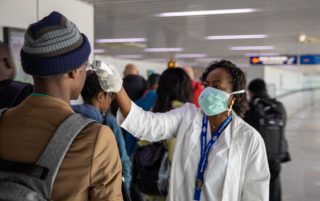It’s been 10 weeks since the first case of Coronavirus (COVID-19) was identified in Wuhan, China. Since then, the virus has spread to 93 countries and territories globally with over 100,000 cases. So far, there’s been over 55,000 recoveries and 3000 deaths at a mortality rate of 3.4 percent. Millions of children are out of school, businesses are shutting down, economies are slowing down. Here are some of the latest updates on COVID-19 globally:
Africa
Cameroon confirmed its first case of COVID-19 today in the person of a 58-year-old French man who entered the country from France last week.
South Africa confirmed its first case of COVID-19 yesterday, Thursday, February 5, 2020. The case is a citizen who had just returned from Italy and was asymptomatic on arrival. The 38-year-old male and his wife were part of a group of 10 people who arrived SA from Italy on March 1, 2020.
President, Cyril Ramaphosa has warned that the presence of the disease will have a negative impact on the country’s already struggling economy, particularly its travel and tourism sector. But he urged South Africans not to panic. The South African authorities are currently conducting a wider search for people the patient had gotten in contact with.
Egypt confirmed a third case of COVID-19 in an Egyptian national, yesterday and 12 new cases on a cruise ship today. Yesterday’s case was a 44-year-old male had just returned from France. He didn’t show any symptoms upon his arrival but fell ill a few days later. The country’s previous cases were foreigners, one of whom recovered.
Morocco also confirmed its second case of COVID-19 yesterday. The patient is a Moroccan citizen who returned from Italy late Wednesday, the country’s health ministry announced.
On Wednesday, February 4, 2020, Algeria reported nine new cases of coronavirus, bringing the total number of confirmed cases to 17.
Senegal also reported two new cases of coronavirus on Wednesday, bringing the total number of cases to four since its first confirmed case on Monday. One of the new cases is the wife of an 80-year-old Frenchman from Paris who had tested positive for the virus earlier. The other is a 33-year-old British woman who arrived in Senegal from London two weeks ago.
Senegal and Nigeria are the only sub-Saharan African countries with confirmed cases of COVID-19. Yesterday, Nigeria said it had isolated a second suspected case of COVID-19. The commissioner of health, Lagos state, Akin Abayomi told a press conference that the suspected case is a Nigerian who went spent a week in France and returned to Lagos four days ago.
“[He] presented with headache and some respiratory symptoms. Because he has been in a country where there is active person to person transmission, it could be a common cold but there’s a possibility that it could be corona,” Abayomi said.
Outside Africa
While Africa has recorded only a few cases of COVID-19, Asia and Europe have become a hotspot for the spread of the virus. Yesterday, Italy recorded 769 new cases of COVID-19 and 41 new deaths, making it the country with the largest daily increase in cases and deaths globally.
Iran also recorded 591 new cases and 15 new deaths yesterday.
Today, both the United States and Canada have 12 new cases respectively.
In light of these latest developments, the WHO has warned that there’s a shortage of personal protective equipment (PPE) caused by increasing demand, panic buying, hoarding and misuse and this is putting lives at risk, especially healthcare workers.
The severe and increasing disruption to the global supply of gloves, medical masks, respirators, and face shields is leaving doctors, nurses and other frontline workers dangerously ill-equipped to care for COVID-19 patients. WHO estimates that industries must increase manufacturing of these equipment by 40 percent to meet mounting global demand.
“Without secure supply chains, the risk to healthcare workers around the world is real. Industry and governments must act quickly to boost supply, ease export restrictions and put measures in place to stop speculation and hoarding. We can’t stop COVID-19 without protecting health workers first,” said Dr Tedros Adhanom Ghebreyesus, WHO Director-General.
Ghebreyesus has warned that countries are not taking COVID-19 seriously as outbreaks surge in the United States and across Europe. “This is not a drill. This epidemic is a threat for every country, rich and poor,” he told reporters last week.








